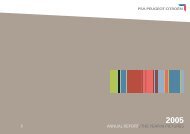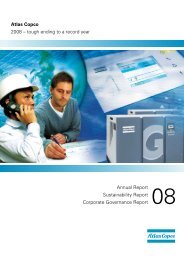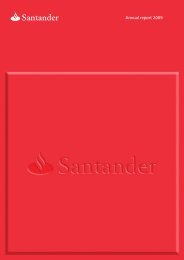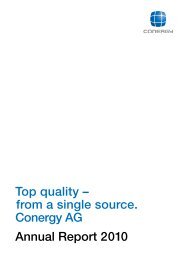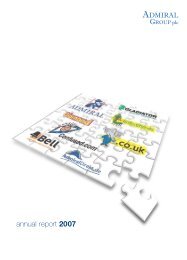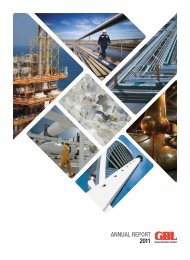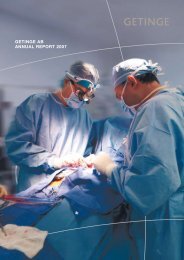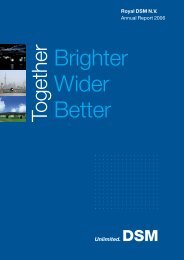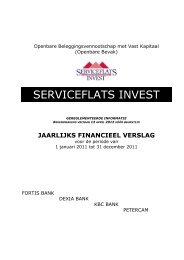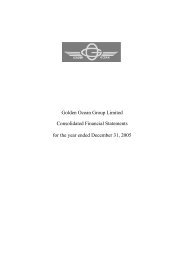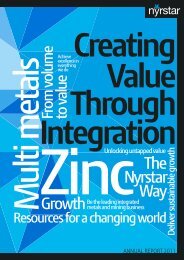Daimler Annual Report 2011 - Alle jaarverslagen
Daimler Annual Report 2011 - Alle jaarverslagen
Daimler Annual Report 2011 - Alle jaarverslagen
You also want an ePaper? Increase the reach of your titles
YUMPU automatically turns print PDFs into web optimized ePapers that Google loves.
We systematically assess the effectiveness of the internal<br />
control and risk management system with regard to the corporate<br />
accounting process. The first step consists of risk<br />
analysis and definition of control. Significant risks are identified<br />
relating to the process of corporate accounting and financial<br />
reporting in the main legal entities and corporate functions.<br />
The controls required for the identification of risks are<br />
then defined and documented in accordance with Group-wide<br />
guidelines. Regular random tests are carried out to assess<br />
the effectiveness of the controls. Those tests constitute the<br />
basis for self-assessment of the appropriate extent and<br />
effectiveness of the controls. The results of this self-assessment<br />
are documented and reported in a global IT system. Any<br />
weaknesses recognized are eliminated with consideration<br />
of their potential effects. At the end of the annual cycle,<br />
the selected legal entities and corporate functions confirm the<br />
effectiveness of the internal control and risk management<br />
system with regard to the corporate accounting process. The<br />
Board of Management and the Audit Committee of the<br />
Supervisory Board are regularly informed about the main control<br />
weaknesses and about the effectiveness of the control<br />
mechanisms installed. However, the internal control and risk<br />
management system for the accounting process cannot<br />
ensure with absolute certainty that material false statements<br />
are avoided in accounting.<br />
In order to ensure the complete presentation and assessment<br />
not only of material risks and risks threatening the existence<br />
of the Group, but also of the control and risk process<br />
with regard to the corporate accounting process, <strong>Daimler</strong> has<br />
established the Group Risk Management Committee (GRMC).<br />
It is composed of representatives of the areas of Finance &<br />
Controlling, Accounting and Integrity & Legal Affairs, and is<br />
chaired by the Board of Management Member for Finance (CFO).<br />
The Internal Auditing department contributes material statements<br />
on the internal control and risk management system.<br />
In addition to fundamental issues, the committee has the<br />
following tasks:<br />
– The GRMC creates and shapes the framework conditions<br />
with regard to the organization, methods, processes and<br />
systems we need to ensure a functioning, Group-wide and<br />
thorough control and risk management system.<br />
– The GRMC regularly reviews the effectiveness and functionality<br />
of the installed control and risk management processes.<br />
Minimum requirements can be laid down in terms<br />
of the design of the control processes and of risk management<br />
and corrective measures can be commissioned as<br />
necessary or appropriate to eliminate any system failings<br />
or weaknesses exposed. But responsibility for operational<br />
risk management for risks threatening the existence of the<br />
Group and for the control and risk management processes<br />
with regard to the corporate accounting process remains<br />
directly with the corporate areas, companies and central<br />
functions. The measures taken by GRMC ensure that<br />
relevant risks and any existing process weaknesses in the<br />
corporate accounting process are identified and eliminated<br />
as early as possible.<br />
In the Board of Management and the Audit Committee of<br />
the Supervisory Board of <strong>Daimler</strong> AG, regular reports are given<br />
regarding the current risk situation and the effectiveness,<br />
functions and appropriateness of the internal control and risk<br />
management system. Furthermore, the responsible managers<br />
regularly discuss the risks of business operations with the<br />
Board of Management.<br />
The Audit Committee of the Supervisory Board is responsible<br />
for monitoring the internal control and risk management<br />
system. The Internal Auditing department monitors whether<br />
the statutory conditions and the Group’s internal guidelines<br />
are adhered to in the Group’s entire monitoring and risk management<br />
system, and if required develops appropriate<br />
measures which are initiated by the management. The external<br />
auditors audit the system for the early identification of risks<br />
that is integrated in the risk management system for its fundamental<br />
suitability to identify risks threatening the existence<br />
of the Group; in addition, they report to the Supervisory Board<br />
on any significant weaknesses that have been discovered in<br />
the internal control and risk management system.<br />
Economic risks<br />
The world economy expanded by a rather average 3.0% in the<br />
economically difficult year <strong>2011</strong> – significantly weaker than<br />
in the prior year, when the rebound from the crisis and the<br />
related stimulus programs brought dynamic growth of 4.3%.<br />
The development of the global economy in 2012 remains fragile<br />
and is thus extremely sensitive to external disturbances.<br />
We see the biggest individual risks for the year 2012 in the<br />
worsening sovereign-debt crisis in the euro zone, the resulting<br />
turmoil in the financial markets and the banking sector, a<br />
growth slump in China and/or the United States, high price<br />
volatility in raw-material markets, further increases in inflation<br />
rates, and nascent protectionism. The development of the<br />
world economy in 2012 that is expected by the majority of<br />
economic research institutions, and also by <strong>Daimler</strong>, is highly<br />
dependent on the development of those risk factors. Some of<br />
those risk factors certainly have the potential, if they occur,<br />
to lead the world economy into a renewed recession. This means<br />
that there are still considerable economic risks for <strong>Daimler</strong>’s<br />
financial position, cash flows and profitability.<br />
114



